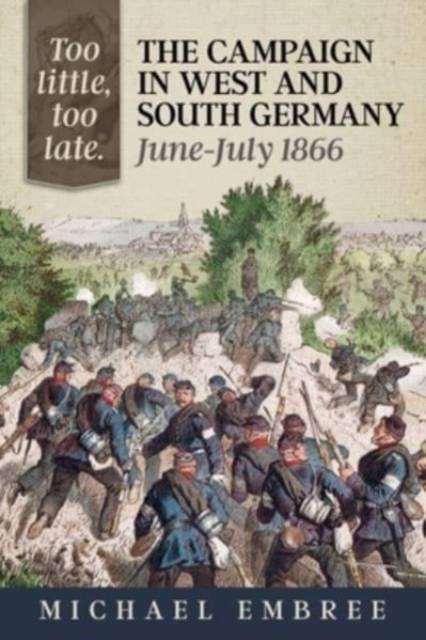
- Afhalen na 1 uur in een winkel met voorraad
- Gratis thuislevering in België vanaf € 30
- Ruim aanbod met 7 miljoen producten
- Afhalen na 1 uur in een winkel met voorraad
- Gratis thuislevering in België vanaf € 30
- Ruim aanbod met 7 miljoen producten
Zoeken
€ 41,95
+ 83 punten
Omschrijving
In the spring of 1866, the so-called German Confederation, then a loose organization of autonomous states, was thrown into crisis by a rift between the two largest members, the Austrian Empire, and The Kingdom of Prussia. Since the founding of the Confederation, in 1815, it had been tacitly accepted that Austria was the overseeing authority. Now, however, a more belligerent Prussia sought a leading role. Under a new and ambitious Chancellor, the ruthless Prince Ottovon Bismarck, Prussia would no longer accept a secondary role.
This vital question of leadership naturally affected all member states, and none could ignore it. Matters had, however, moved beyond discussion, and, in June, hostilities began, with the Prussian invasion of the Kingdom of Hanover, and the Electorate of Hesse-Cassel.
This volume chronicles the conflict over the unification of Germany which actually occurred on German soil. The campaign in southern and western Germany ensured that political control of German affairs would be firmly in Prussian hands, controlled by Bismarck, in much the same way that the great battles between Prussia and Austria in the east would exclude Austria from German affairs altogether.
The detailed story of this, the war of unification within Germany itself, is narrated here, compiled from numerous published and unpublished sources, including many contemporary and first-hand accounts, as well as official reports. The importance of the campaign, far too often ignored, is told here. This is an invaluable resource for any student of European military history of the mid-19th Century.
Key topics include the historical background to the conflict, the political crisis of 1866 in the "German Parliament" and the build-up to war, full descriptions of all military forces involved, the various phases of the campaign. The book includes comprehensive orders of battle, informative maps, numerous illustrations (some in color) and photographs, many informative charts and diagrams. The author also presents a detailed analysis of contemporary and later sources.
This vital question of leadership naturally affected all member states, and none could ignore it. Matters had, however, moved beyond discussion, and, in June, hostilities began, with the Prussian invasion of the Kingdom of Hanover, and the Electorate of Hesse-Cassel.
This volume chronicles the conflict over the unification of Germany which actually occurred on German soil. The campaign in southern and western Germany ensured that political control of German affairs would be firmly in Prussian hands, controlled by Bismarck, in much the same way that the great battles between Prussia and Austria in the east would exclude Austria from German affairs altogether.
The detailed story of this, the war of unification within Germany itself, is narrated here, compiled from numerous published and unpublished sources, including many contemporary and first-hand accounts, as well as official reports. The importance of the campaign, far too often ignored, is told here. This is an invaluable resource for any student of European military history of the mid-19th Century.
Key topics include the historical background to the conflict, the political crisis of 1866 in the "German Parliament" and the build-up to war, full descriptions of all military forces involved, the various phases of the campaign. The book includes comprehensive orders of battle, informative maps, numerous illustrations (some in color) and photographs, many informative charts and diagrams. The author also presents a detailed analysis of contemporary and later sources.
Specificaties
Betrokkenen
- Auteur(s):
- Uitgeverij:
Inhoud
- Aantal bladzijden:
- 278
- Taal:
- Engels
- Reeks:
Eigenschappen
- Productcode (EAN):
- 9781804513774
- Verschijningsdatum:
- 28/07/2023
- Uitvoering:
- Paperback
- Formaat:
- Trade paperback (VS)
- Afmetingen:
- 155 mm x 234 mm
- Gewicht:
- 488 g

Alleen bij Standaard Boekhandel
+ 83 punten op je klantenkaart van Standaard Boekhandel
Beoordelingen
We publiceren alleen reviews die voldoen aan de voorwaarden voor reviews. Bekijk onze voorwaarden voor reviews.











